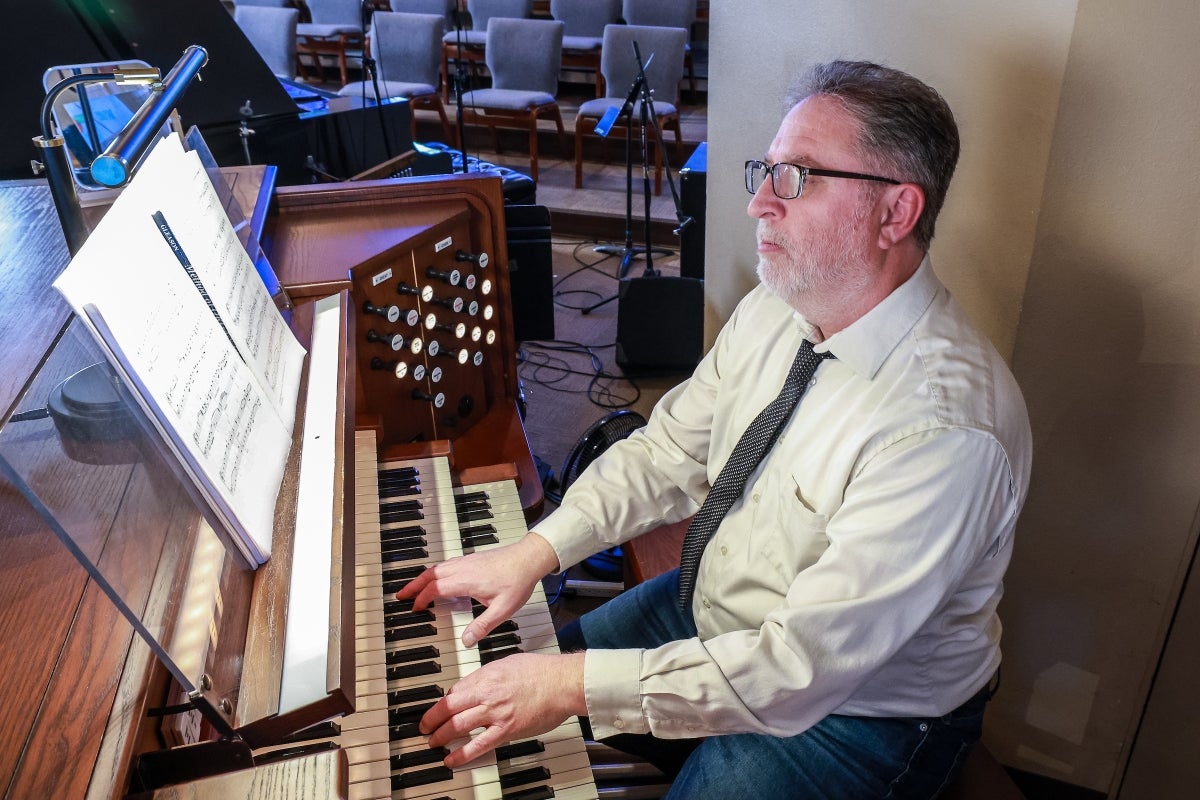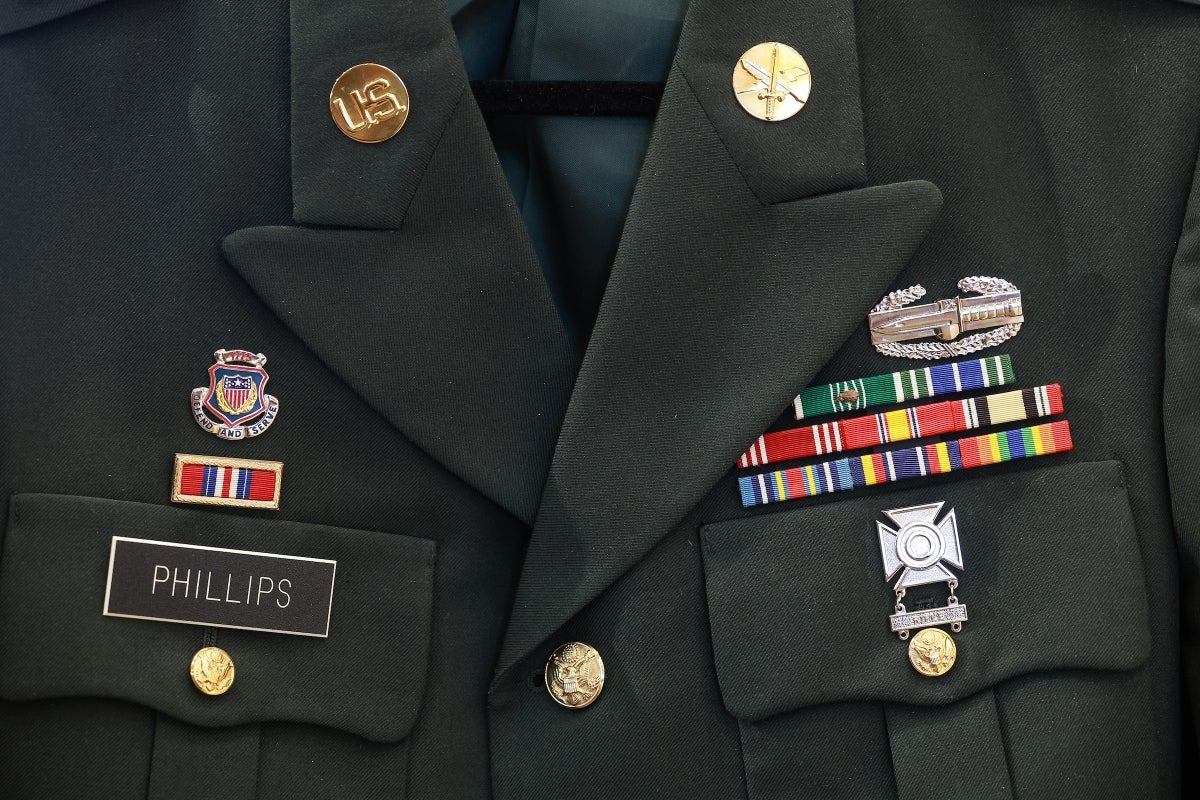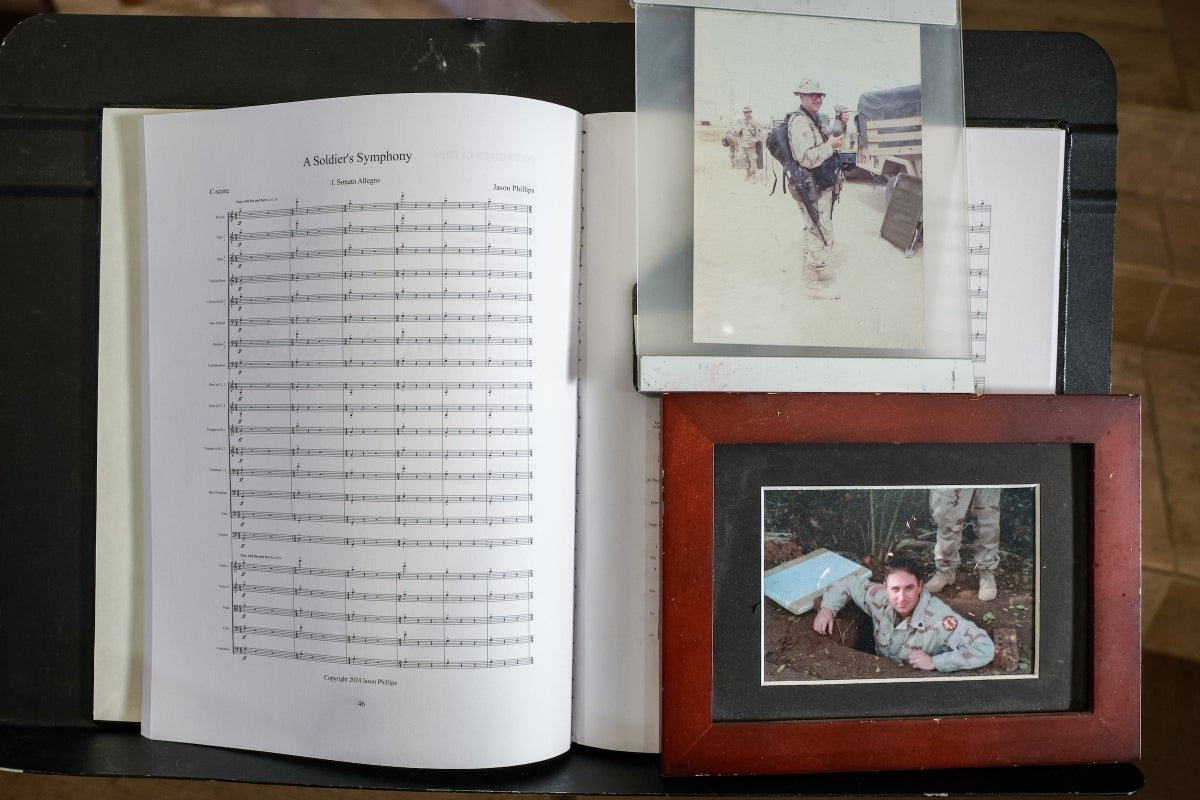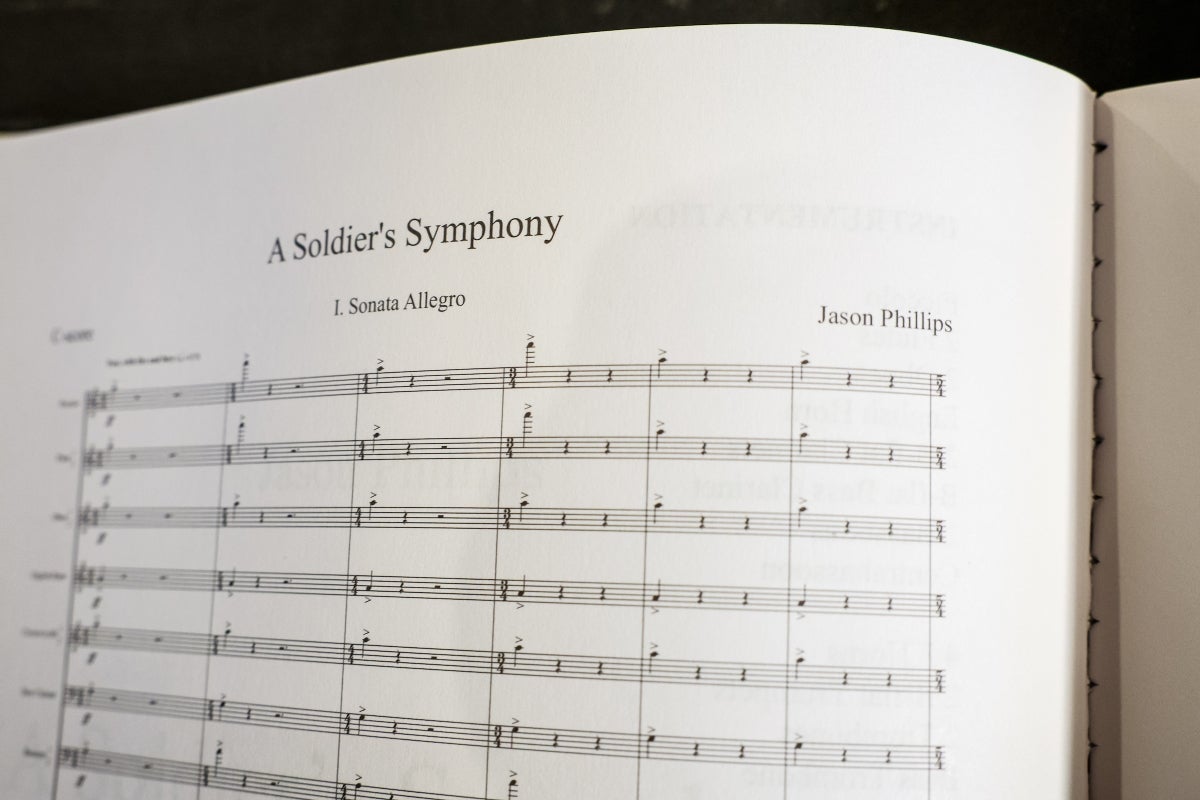A symphony of service: Iraq War vet and ASU alum finds healing through music

ASU alumnus and veteran Jason Phillips, the music director of Mountain View Lutheran Church in Phoenix, performs some of his favorite classical pieces at the church on Friday, Oct. 25. Photo by Charlie Leight/ASU News
At the age of 30 and only one credit away from obtaining his bachelor’s degree in piano performance, Jason Phillips could no longer stifle the feeling that he was stuck.
He was teaching at a music conservatory in Pasadena, California, and was studying composition privately under Ian Kraus, a prestigious music professor at UCLA. But something was missing.
“I was doing well, but in my personal life and even in some of the things I wanted to do as a pianist and a composer, I just wasn’t moving forward,” said Phillips, a Mesa resident and the music director at Mountain View Lutheran Church in Phoenix. “I just kept pounding my head against a wall.”
Phillips wanted to be part of something bigger than himself. His grandfather had served in World War II, and he had always admired service members.
“So I went down to the recruiter's office and said, ‘I’m ready to join the Army,’” Phillips recalled. “I remember them laughing at me because they told me it was usually the recruiter who pressures the recruit.”
Initially, Phillips didn’t expect to have to engage in combat during his service. But his orders listed his start of service date as Sept. 11, 2001.
“After our group raised our right hands and swore an oath to the Constitution of the United States, we all sat in our chairs waiting for a ride to boot camp,” Phillips said. “I fell asleep but then was awakened by alarms and sirens. I hear doors opening and shutting and people running up and down the hallways. A specialist comes in and escorts us into a big conference room where there’s a hundred new recruits sitting at the table and on the floor watching the twin towers burning on a large-screen TV.”
Phillips sensed he had just joined a wartime Army.
A ticking clock
He was deployed to Iraq for 18 months from March 2003 to December 2004 where, as an Army journalist and photographer, he wrote about and photographed soldiers of the 720th Military Police Battalion and 89th Military Police Brigade performing missions in some of the most dangerous parts of Iraq and conducting raids that led to the capture of Saddam Hussein.
While in Iraq, he was first stationed at Forward Operating Base near Tikrit, and then at Camp Victory, the area beside the Baghdad International Airport, which, beginning in September 2004, was under almost daily assault from mortars and rockets.
He saw things he wishes he hadn’t.
“I served with a sergeant, a lighthearted guy, who had a rocket grenade hit on the door of his Humvee. It took off part of his face,” Phillips said. “I also wrote a story about a staff sergeant in charge of inspecting Iraqi police stations and spent the day riding with him to four stops in Baghdad. I asked him questions about his job, but he spent most of his time talking about his 12-year-old daughter and his son, who was also young, and how he was looking forward to connecting with them when he got back. He was retiring. The next morning a rocket hit his trailer, which was about 10 feet from mine.”
The blast shook Phillips out of his sleep but left him dazed and confused.
“I don’t remember hearing any sound. I felt like I was in a dream and floating. I lost track of time,” Phillips recalled. “Then I woke up and was face down on the floor. There was Mountain Dew soda all around me because my roommate kept it under his bed. Glass all around me. So I pushed myself up. I get to the door of my trailer and look outside and there’s this column of fire that seemed to go a hundred feet into the air. I was taken to a parking lot for safety, and that’s when they told me that about the staff sergeant who didn’t make it.”
Phillips said after that experience, he spent every night staring at the ceiling of his trailer wondering if a rocket was going to take his life.
“It was like a clock ticking and every second seemed to be an eternity, waiting for that moment,” Phillips said. “I couldn’t sleep in the trailer, so I would go to one of our chapels and sleep on a pew until the cleaning staff came in and poked me with a vacuum.”
It wasn’t much safer outside of Phillips’ camp. He went on rides with soldiers to document their missions, which only compounded his anxiety.
“We’d drive by craters that were the size of a school bus and I remember curling up in a ball in the middle of the Humvee with my helmet over my head and my flack vest on, waiting for the …” Phillips said, unable to finish the thought. “A day before, a squad of marines had been killed. It was a low point and the most devastating wartime experience for me.”
Returning to civilian life
Despite the horrors he witnessed, Phillips signed up for a second deployment.
“I loved those people and we were all like family,” Phillips said. “Those horrible experiences bring you together. But by then I had already been experiencing what we now know as PTSD.”
It started with frequent nightmares and insomnia in Iraq, both of which were compounded by gunfire at firing ranges and artillery explosions in the distance when he returned to the barracks at Fort Hood (now Fort Cavasos), Texas. Loud noises, slamming car doors or sudden pops gave way to fits of uncontrollable rage.
He began seeing a military chaplain, who suggested mental health counseling. Health counselors recommended that Phillips not return to Iraq for a third deployment.
“It was an expeditious way for the military to make sure I didn’t redeploy,” Phillips said. “My contract was up in July 2006, and mental health professionals told my unit I should not deploy again. I was honorably discharged in time to get married to my wife and start my civilian life.”
Phillips met and corresponded with his wife, Josephina, online during his second deployment. They settled in Fountain Valley, California — a stone’s throw from an iconic theme park.
“Our apartment was within sound range of Disneyland, and I’d hear fireworks every night,” Phillips said. “It tortured me.”
They moved to Brenham, Texas, after a year, which Phillips says was a “good landing” for the couple. It was there where got his first job in music after the Army. He served as director of music at St. Mary Immaculate Conception Catholic Church, and as director of choir and vocal studies at Blinn College, where he also taught music literature, music appreciation and class piano.
It was a good place to start a family. Jason and Josephina eventually had four children.
The turning point
Life was good for a while, but the nightmares never went away. And with that came other problems.
“The nightmares, substance abuse and outbursts of anger were distressing to my family,” Phillips said. “We didn’t go out to large events. I used to love going to see baseball games and concerts, but there was no longer any of that. I felt like I was just holding on to my sanity by a very thin thread.”
Phillips said whenever he’d read or hear about a shooting or massacre, it was upsetting.
“I remember when the Virginia Tech shooting spreeThis shooting incident occurred on April 16, 2007. took place and I was in a parking lot eating a cheeseburger,” Phillips said. “As I heard about the shooting, I just got sick to my stomach. I looked at the meat and it resembled things I didn’t want to remember.”
Phillips’ fraying mental and emotional condition placed a heavy burden on his wife and children. He said Josephina was extremely supportive and accepting of his PTSD. And with some gentle prodding, she pushed him to get the help he needed.
“I was very concerned for (Jason) and our family because I felt like he didn’t have the support he needed to make it through that,” Josephina said. “I didn’t want our family to be in the position of trying to figure this out on our own. The reality is he had to figure this out for himself, and eventually he did. But it took a very long time to where he came out of that dark place and landed in a much better place because he bottled it up and never really healed from that experience.”
It took more than a decade for Phillips to seek counseling, but he finally did in 2015 when he bottomed out.
“My wife had to call law enforcement to our home one day. When that happened, I realized that I had to get help or my life was gonna go in the direction of never going back,” Phillips said. “I entered a mental health program at the Veterans Administration, for the first time, and it really helped. I regret waiting so long.”
Healing through music
That same year, Phillips was accepted into a PhD program in music at George Mason University in Fairfax, Virginia.
“I enjoyed the teaching element of my church music work, but after I melted down and fell apart, I had to do something that was just for me to put myself back together,” Phillips said. “The memories that I have never go away, the psychological wounds that I carry never go away. And music is the sound world that helps me live every day with those realities.”
While at George Mason, another reality hit Phillips — he switched majors from music education to composition. It brought him to Arizona State University in the spring of 2021, where he enrolled in the School of Music, Dance and Theatre.
For his capstone project, he wrote a composition for a symphony orchestra titled “A Soldier’s Symphony.” The 30-minute piece was a personal account of his time at war set to music that depicts trauma, triumph and ultimately, healing.
“I wanted the composition to convey my experience in war and after war,” Phillips said. “I also want it to start public conversations about what is the cost of war. We do a good job honoring the dead in this country, as well as those who are physically wounded. We haven’t done such a great job helping and honoring those with psychological war wounds.”
Phillips graduated with a Doctor of Musical Arts degree on May 6, seeking a symphony orchestra to give the debut performance of “A Soldier’s Symphony” to highlight the issues combat veterans encounter after war, as well as the ways individuals and institutions can help them confront and overcome these challenges.
This month, he had a few takers.
The 70-member ASU Philharmonia will perform “A Soldier’s Symphony” during a two-hour concert at ASU Gammage, scheduled for fall 2025.
Julie Debordes, the Philharmonia’s music director who has been teaching as a faculty associate at ASU since 2019, called the symphony an inspiration.
“(Phillips’) story is inspiring and the music itself is also inspiring,” Desbordes said. “The music conveys the message properly. Perfect.”
New horizons
Melita Belgrave, associate dean for culture and access in the Herberger Institute for Design and the Arts and associate professor of music therapy in the School of Music, Dance and Theatre, said she is in discussions with ASU’s Pat Tillman Veterans Center to create an event or symposium around “A Soldier’s Symphony” for next year’s Salute to Service.
Details are currently being worked out, but Belgrave sees great potential for art and discovery.
“We are in the dreaming phase right now and exploring what it could really look like,” Belgrave said. “We are definitely looking at connecting with the veteran community to help tell their stories through art and design. We’re looking for partners that want to contribute, making this a one- or two-day event.”
Shawn Banzhaf, executive director of the Tillman Center, said Phillips’ sacrifice through sharing his personal story is selfless and can be used for the greater good.
“We are excited and honored to give Jason the space to showcase something beautiful forged from the trials and tribulations of his journey,” Banzhaf said. “It shows other veterans that there are all sorts of methods to find healing in the arts.”
Josephina said she’s amazed by the outpouring of support for her husband and his music.
“I’m extremely proud of Jason because he has certainly worked hard to do this,” she said. “It’s the first in line of many other symphonies I know that are in there.”
More Sun Devil community

Tested tips for taking exams
With May quickly approaching, many students are starting to prep for their most important tests of the year — final exams.Toni Miceli, the inaugural director of the bar exam success program at…

School of Transborder Studies celebrates 15th anniversary
During the summer before his freshman year at Arizona State University, Salvador Macias participated in the AGUILA Youth Leadership Institute, a college access organization designed to help young…

Barrett program unlocks study abroad for first-year honors students
Twenty first-year students from Barrett, The Honors College at Arizona State University are spending their second semester studying abroad in Rome, Italy.Traveling in a tight-knit honors community…





